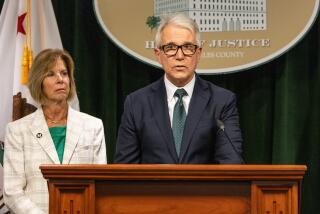Penalty phase awash in tears
- Share via
Several jurors wept Monday as they listened to emotional testimony from those who lost loved ones three years ago because Juan Manuel Alvarez parked his vehicle on railway tracks, triggering the worst train wreck in Metrolink history.
The tears flowed from jurors as well as witnesses on the first day of testimony in the penalty phase of Alvarez’s trial in Los Angeles County Superior Court. At one point, presiding Judge William R. Pounders told the prosecutors and defense attorneys that he noticed jurors were “having a hard time.”
“Almost all are crying,” Pounders said. He later advised the panel of nine women and three men that “if you start to lose it, and you can’t take it anymore for a while, let me know and we’ll take an extra break.”
The same jurors last month convicted Alvarez of first-degree murder. Now, they must decide what the punishment should be for the former Compton laborer, who on Jan. 26, 2005, parked his sport utility vehicle on the railway tracks near downtown Glendale and fled.
A Metrolink passenger train slammed into his vehicle, causing it to derail and collide with two other trains. In addition to the 11 passengers killed, at least 180 were injured.
Maureen Tutino, the mother of James Tutino, a former Los Angeles County sheriff’s deputy, was among relatives who paid homage to their deceased loved ones from the witness stand. Tutino cried as prosecutors showed photos of her son, many of them taken at the family’s annual Christmas reunion.
James Tutino, a 23-year veteran of the Sheriff’s Department, didn’t typically take the train, his mother testified. But it was raining the day of the crash, and his knee was bothering him.
“Our whole family will never ever be the same, never ever,” Maureen Tutino said. “It’s way too hard. It’s really hard to realize that he’s never going to come through the door again. He was kind of the sunshine in our lives, and we’re going to miss that.”
Tutino’s brother Tony testified that the hardest thing was not being able to properly bid his sibling farewell.
“Because of the injuries he suffered during the incident, I had to say goodbye through a coffin,” Tony Tutino said, choking back tears.
Gregory Gordon, whose sister Julia Bennett was killed in the crash, said her death was devastating to his family. Their father, he said, died three months after the tragedy.
“He was absolutely not the same without her,” Gordon said.
Several jurors dabbed their eyes or hung their heads when Bennett’s daughter Lyndsay sobbed as she spoke of how much she loved and missed her mother.
Prior to the emotional testimony from the victims’ relatives, prosecutors addressed the jurors and made the case that Alvarez deserved the death sentence for his crimes.
Anything less, said Deputy Dist. Atty. Cathryn Brougham “is not justice.”
Brougham told jurors that imposing a death sentence would be a difficult but necessary task.
“What is important is that you make the right decision, and sometimes the right decision can be hard,” she said.
Alvarez’s defense attorneys did not make any opening statements for the jury Monday, saving their remarks for when they present their case and argue that Alvarez deserves some leniency.
During his eight-week trial, Alvarez, 29, testified that he had planned to commit suicide on the day of the incident but changed his mind.
He said he was unable to dislodge his vehicle from the tracks before the train hit it. Alvarez, who said he had been a drug addict and was abused as a child, apologized to the victims’ families and asked for forgiveness.
On Monday, Brougham said Alvarez’s actions were no accident. He had ample opportunity to change his mind, she said, but “he was on a mission. He wanted to do something big . . . He had a goal and a target, and he executed his plan.”
“An apology without taking responsibility is shallow. It means nothing,” Brougham said. “These are just words to get your sympathy.”
Brougham asked the jury also to consider the effect of Alvarez’s deed on the victims’ families and on those who were injured but survived the crash. Several photographs of each victim were flashed on a screen.
“You can only begin to imagine the damage that this man has caused,” the prosecutor said, as she gave brief profiles of the deceased. “Each was a unique individual with a future, with a family, with hopes, with dreams.”
--
More to Read
Sign up for Essential California
The most important California stories and recommendations in your inbox every morning.
You may occasionally receive promotional content from the Los Angeles Times.














